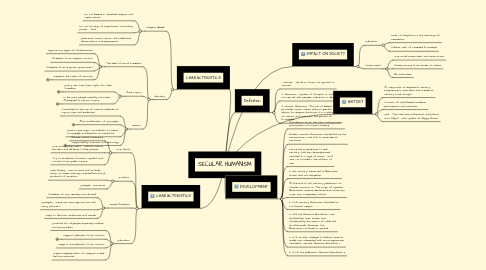
1. CHARACTERISTICS
1.1. One World
1.1.1. Achieve world community
1.1.2. One world government - without national borders and different state policies
1.1.3. Try to eradicate Christians symbols and content from public square
1.2. Evolution
1.2.1. Julian Huxley - 'man...his mind and his body were not supernaturally created but are all products of evolution'
1.2.2. Example : Darwinsm
1.3. Sexual Freedom
1.3.1. Freedom of any sexuality are allowed
1.3.2. Examples : Same sex marriage and sex with many partners
1.3.3. Right to abortion, euthanasia and suicide
1.4. Education
1.4.1. Essential for all people especially children and young adults
1.4.2. Support education from schools
1.4.2.1. Moral values
1.4.2.2. Intelligence and academic
1.4.2.3. Characters' building
1.4.3. Support the education from schools
1.4.4. Reject implementation of religious creed before matured
2. CHARACTERISTICS
2.1. Religious Belief
2.1.1. Do not believe in revealed religious and supernatural
2.1.2. Do not worship of superhuman controlling power - God
2.1.3. Embraces human reason and intellectual - Observations and experiments
2.2. Morality
2.2.1. The ideal of moral freedom
2.2.1.1. Oppose any types of totalitarianism
2.2.1.2. Freedom from religious control
2.2.1.3. Freedom from jingoistic government
2.2.1.4. Respect the rights of minority
2.2.1.4.1. Rights to protect life
2.2.1.4.2. Rights for liberty
2.2.1.4.3. Rights to pursuit the happiness
2.2.2. Free inquiry
2.2.2.1. Every man have their rights for their freedom
2.2.2.1.1. Oppose any tyranny over the mind of man or force that oppose free thoughts
2.2.2.1.2. Tolerate the diversity of opinion of other people
2.2.2.2. In the past, people ruled by churches - Attempted to censor inquiry
2.2.2.2.1. Established institutions attempted to censor inquiry
2.2.3. Reason
2.2.3.1. Committed to the use of rational methods of inquiry, logic and evidences
2.2.3.2. Allow modification of principles
2.2.3.2.1. Human make mistakes so need for constant correction
2.2.3.3. Reason give major contribution to human knowledge and benefits to humankind
2.2.3.4. Supported by sciences and techology
2.2.3.4.1. Most reliable to understand the world
2.2.3.4.2. Can be seen by the evidences and proofs
2.2.3.4.3. Not supernatural or unseen
3. IMPACT ON SOCIETY
3.1. Education
3.1.1. Does not emphasis on the teachings of revealation
3.1.2. Children lack of revealed knowledge
3.2. Government
3.2.1. One world government will cause chaos
3.2.2. Freely moving from states to states
3.2.3. No authorities
